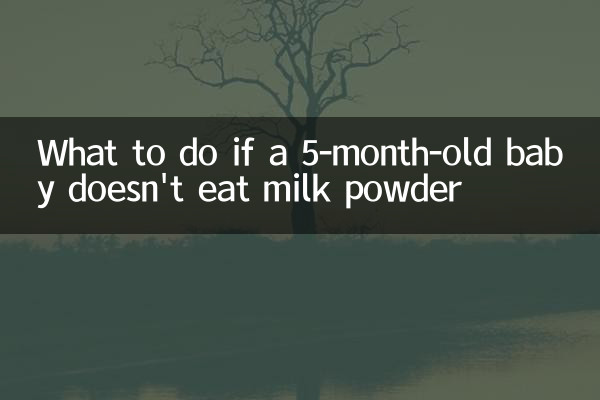What should I do if my 5-month-old baby doesn’t eat milk powder? Must-see solutions for new parents
Recently, the topic of "a 5-month-old baby suddenly refuses to eat milk powder" on parenting forums and social media has remained high, and many new parents are anxious about it. This article combines popular discussions and expert suggestions from the entire network for the past 10 days to organize structured solutions to help parents respond to this problem scientifically.
1. Analysis of common causes of baby's milk refusal

| Cause Type | Specific performance | Percentage (online discussion data) |
|---|---|---|
| Physiological breast aversion period | Suddenly, the food intake is reduced but the mental state is good | 42% |
| Feeding method issues | Discomfort flow rate of pacifier/improper feeding posture | 28% |
| Milk powder is not adapted | Allergic reactions such as constipation/diarrhea/rabs | 18% |
| Environmental interference | Noise/Highlight/Stranger and other external stimulation | 12% |
2. Targeted solutions
1. Coping with physiological breast aversion period
(1)No forced feeding: Keep the interval of 4-5 hours to avoid aggravating resistance
(2)Increase exercise consumption(3)Night feeding: Use sleep hazy period to supplement milk
2. Optimization of feeding method
| Improvements | Specific operations | Effective time |
|---|---|---|
| Pacifier selection | Change the appropriate flow rate according to the age (suggested SS number) | 1-3 days |
| Feeding Position | 45 degrees oblique hug, the bottle is perpendicular to the face | immediate |
| Temperature control | Keep 38-40℃ (test on the inside of the wrist) | immediate |
3. Milk powder adjustment strategy
(1)Step-by-step transition method: Mix new and old milk powder in a ratio of 3:7→5:5→7:3
(2)Special recipe selection: Consider alternatives such as moderate hydrolysis/goat milk powder
(3)Add probiotics: After consulting a doctor, supplement specific strains such as BB-12
3. Top 5 effective methods for netizens to test
| method | Key points of implementation | Success rate |
|---|---|---|
| Hunger therapy | Extend the feeding interval to 5-6 hours | 73% |
| Confused milk | Light sleep state feeding | 68% |
| Change feeder | Feed by non-breastfeeding people | 52% |
| Toy distraction | Distract attention with rattle, etc. | 45% |
| Change the environment | Feeding in a quiet and dark room | 39% |
4. When do you need medical treatment?
It is recommended to seek medical treatment in a timely manner if the following situations occur:
• No food at all for 24 hours
• Significantly reduced urine output (<6 times/day)
• Accompanied by fever/vomiting/sleeping
• Weight loss of more than 7%
5. Experts’ special reminder
Director Zhang of the Capital Pediatrics Institute emphasized: "5 months of age is the preparation period for supplementary food addition. You can try to feed a small amount of milk powder with a silicone spoon to avoid confusion of nipples and cultivate eating skills. However, the daily milk volume still needs to be maintained at 600-800ml, and abnormal growth and development curves require professional evaluation."
The data in this article are summarized from Weibo's Super Talk #Milk Aversion Period Coping# (230 million views), Zhihu's popular Q&A (87,000 collections), and Babytree and other parenting apps in the past 10 days. Parents are advised to flexibly adjust the plan according to the individual differences of the baby.

check the details

check the details